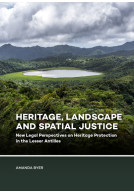Heritage, Landscape and Spatial Justice (Paperback)
New Legal Perspectives on Heritage Protection in the Lesser Antilles
By
Amanda Byer
Imprint: Sidestone Press
Pages: 200
ISBN: 9789464280395
Published: 10th October 2022
Script Academic & Professional
Imprint: Sidestone Press
Pages: 200
ISBN: 9789464280395
Published: 10th October 2022
Script Academic & Professional
You'll be £30.00 closer to your next £10.00 credit when you purchase Heritage, Landscape and Spatial Justice. What's this?
+£4.99 UK Delivery or free UK delivery if order is over £40
(click here for international delivery rates)
Need a currency converter? Check XE.com for live rates
(click here for international delivery rates)
Need a currency converter? Check XE.com for live rates
The Caribbean region faces particular environmental challenges as a result of colonial land use, pressures from tourism and globalisation, as well as climate change. No less affected are its heritage resources, which include natural and cultural elements crucial to economic survival and local identity. This research explores the relationship between land, law and heritage in order to better understand the regulatory failures that undermine heritage protection in the English-speaking Caribbean. Using a spatial justice lens to examine the legal framework of eight islands in the Lesser Antilles, the analysis posits that domestic heritage laws are ineffective, because they ignore the relevance of local places or landscapes to the formation of heritage. Relying instead on ideas of land as abstract property rights, heritage is presented as a mere visual embellishment that can deteriorate into an unsightly and costly burden for the landowner or State, rather than the outcome of dynamic and locally unique interactions between people and place. While domestic laws continue to classify heritage as objects, sites and buildings with fixed aesthetic value, international law has adopted a more progressive stance, placing community relationships with landscape at the heart of heritage protection strategies. Empowering communities to contest unsustainable treatment of the landscape can potentially lead to the recognition of the value of landscape integrity to sustainable heritage, and influence change at the national level. Integrating landscape considerations into the legal framework can make law more responsive to the nuances and limits of the local cultural and natural environment. These dynamic landscape processes are also relevant to debates concerning climate change, ecosystem degradation, access to public spaces and environmental human rights. As such, this work should be of interest to legal practitioners in heritage and environmental law, planners, geographers and other academia exploring socio-legal approaches to sustainable development.
There are no reviews for this book. Register or Login now and you can be the first to post a review!
Other titles in Sidestone Press...















